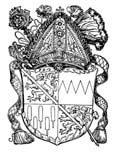
Catholic Confusion at the Very Top
OVERCOMING MY RESISTANCE TO FACE THE FACTS
I do not think it would be difficult to reach a broad consensus among NOR readers that the state of the Catholic Church today is downright confusing on many fronts. Where we would begin to diverge from one another is in the analysis of the root causes of that confusion. Although all would likely agree that there is no single source, orthodox Catholics have increasingly stated in public that at least part of the confusion in the Church today has its origins at the very top — that some of the words, deeds, and omissions of Pope John Paul II are causing confusion among faithful Catholics. To state this, however, is immediately to raise some hackles — hackles that I myself have experienced until recently. In a letter to the editor published in the NOR (Oct. 2003), Bill Foley chided the NOR for criticizing the Pope. Indeed, there are those who believe that any criticism of the Pope leads to undermining papal authority as such. I agree that such a danger exists.
But I have come to believe that there is also a danger in not speaking out. The difficulty is that if a certain hierarch — whether priest, bishop, or pope — is particularly well respected, the faithful under his charge may be tempted to take his every word, action, and even inaction as a positive example. They may be tempted to conform their understanding of right Catholic faith and practice to the man, rather than the man to the Faith.
In This Rock magazine (Oct. 2003), James Hitchcock and Fr. Brian Harrison pointed to certain of John Paul’s words and deeds in which they believe sound and trustworthy leadership and example have been lacking. Hitchcock focused on concern over the lack of ecclesiastical discipline in John Paul’s pontificate, speaking of “an almost principled reluctance to exercise his disciplinary powers.” Indeed, this is an aspect of the Holy Father’s pontificate that a number of orthodox Catholic commentators — including Karl Keating, Rod Dreher, and the NOR — have seen as a genuine weakness. Fr. Harrison extends this negative assessment beyond matters of discipline, discussing certain liturgical issues, questions raised by various ecumenical activities, and points of private teaching as well. Although this might strike some as presumptuous and disloyal, Fr. Harrison points out that the Church’s law provides for just this sort of expression:
[The faithful] have the right, indeed at times the duty, in keeping with their knowledge, competence, and position, to manifest to the sacred pastors [bishops] their views on matters that concern the good of the Church. They have the right also to make their views known to others of Christ’s faithful, but in doing so must always respect the integrity of faith and morals, and take into account both the common good and the dignity of individuals. (Canon Law 212)
Fr. Harrison further notes that “No clause in canon 212 exempts the words, deeds, policies, or omissions of a pope himself from such criticism. Moreover, by affirming the right of the faithful ‘to make their views known to others of Christ’s faithful’ as well as to the Church’s pastors, this canon makes clear that public as well as private criticism can be legitimate.”
You May Also Enjoy
We can make peace with nature only by restoring harmony within ourselves. It is holiness that manifests our true nature in the plan of God.
When people hear the priests talking about a Feast of Mercy that can give them total forgiveness of sins and punishment, they will perk up and respond.
Advocates of the American death penalty must stop hiding behind the Bible, or rather behind those three verses they quote out of context.

